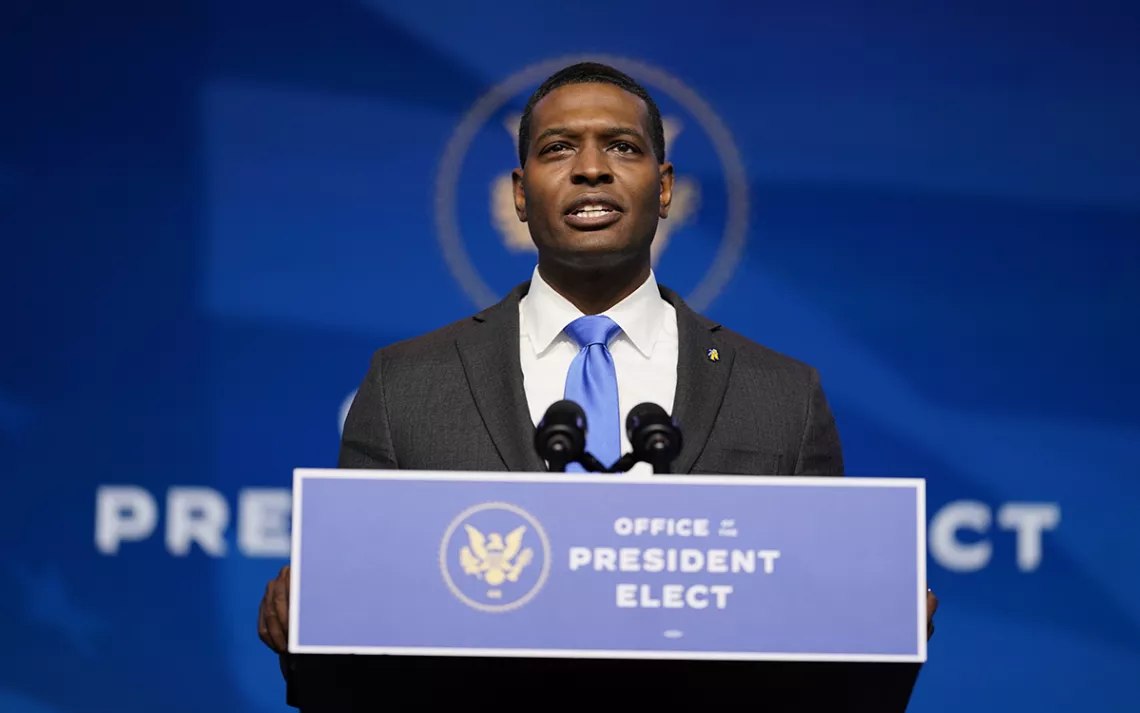A Look at Biden’s Climate and Environment Roster
Here’s a rundown of Joe Biden’s picks to spearhead his climate action agenda

Michael Regan, the Biden nominee for EPA administrator | Photo by AP Photo/Carolyn Kaster
The opinions expressed here are solely those of the writer and do not necessarily reflect the official position of the Sierra Club.
Joe Biden ran on the most ambitious climate plan in history, with a larger focus on environmental justice than any presidential candidate before. Now, his recently announced nominations for cabinet-level positions show that the Biden-Harris administration is preparing to fulfill those climate and environment promises.
Overall, Biden’s cabinet is mostly comprised of centrists and Obama-era insiders. But his picks for positions that are related to climate change and the environment climate team stands out as a little more progressive than the rest of the cabinet. It’s an encouraging start—a mix of tested government veterans, some fresh faces, and a truly groundbreaking choice for secretary of the interior.
Here’s the roster:
Biden has already promised to return the United States to the Paris Agreement on day one of his administration to help restore the United States’ credibility with foreign powers. He has chosen John Kerry, the former senator and secretary of state under Barack Obama, to take on the big job of a newly created position, “special presidential envoy on climate change.”
Kerry is a smart pick for this, as he is well known to foreign leaders and he’s credited with, among many other highlights, the international Kigali Amendment to phase out hydrofluorocarbon “super-pollutants.” Kerry will be the first person with a climate portfolio to sit on the National Security Council. Like Biden, he knows that the Paris Agreement is just a start.
Kerry’s domestic counterpart will be the former EPA director Gina McCarthy, also an Obama administration veteran. As the head of a new White House Office of Domestic Climate Policy, she will be coordinating climate-related policies across multiple federal agencies and Congress. She has received praise from both progressive climate hawks such as the Sunrise Movement as well old-school, centrist types such as Al Gore for her blunt, direct manner of speaking and effectiveness. Notably, Biden named a deputy for the position: Ali Zaidi, who helped craft the president-elect’s “Build Back Better” platform.
Michael Regan, who has been running the North Carolina Department of Environmental Quality since 2017, has been nominated to run the US EPA, where he is expected to prioritize environmental justice. Biden’s choice of Regan has generated a measure of controversy in some quarters. While some groups have praised Regan as a dealmaker able to work with a Republican state legislature and a Democratic governor, other environmental organizations have criticized him for moving too slowly, especially on the issue of PFAS contamination. For its part, the Sierra Club has celebrated Regan’s nomination and applauded his work bringing Duke Energy to an agreement to clean up coal ash, a major environmental justice issue in North Carolina. This year, Regan received a national Sierra Club award for his coal ash cleanup work.
Deb Haaland is perhaps the most progressive person tapped for Biden’s cabinet—and by far the most electrifying. Haaland is a first-term member of Congress, former chair of the New Mexico state Democratic Party, and an enrolled member of the Pueblo of Laguna. If confirmed by the Senate, Haaland will become the first Native American to lead the Interior Department—an agency with a long and blood-soaked history of hostility to Native Americans. For that reason alone, her choice is groundbreaking. Equally important, she’s an outspoken advocate for the Green New Deal, a proponent for keeping fossil fuels in the ground, and one of the main congressional champions of the “30x30” goal to conserve 30 percent of US lands and waters by 2030. Haaland would be the person who can make Biden’s campaign promise of no new fossil fuel permits on federal land into a reality. Republicans have already signaled a confirmation brawl over both her and Regan.
Jennifer Granholm has been chosen to serve as secretary of energy. Before the Obama administration, this agency dealt primarily with nuclear matters: overseeing civilian atomic energy facilities, managing nuclear waste, and working with the military to safeguard the country’s nuclear weapons arsenal. During Obama’s first term, the agency broadened its portfolio to include renewable energy; under Trump, Energy Secretary Rick Perry acted as a cheerleader for an “energy dominance” agenda made possible by fracking. Granholm is expected to take the department in a new direction: one that’s bullish on battery technology for electric vehicles. She was Michigan’s governor from 2003 to 2011 and thus has a solid working relationship with Detroit automakers. She’s a vocal cheerleader for the Green New Deal and green jobs and wrote an op-ed shortly after the election touting clean energy as a better economic path for Michigan. As with Haaland, oil-state Republican senators are unhappy with this nomination.
Brenda Mallory has been selected to chair the Council on Environmental Quality. She is currently an attorney at the Southern Environmental Law Center. Before that, she served as an Obama-era attorney at CEQ, so she knows the agency well. She’s expected to bring an environmental justice lens to the council. One hitch: It’s not yet clear how Gina McCarthy’s position and her responsibility for coordinating multiple federal agencies will intersect with this existing position. The CEQ already has the job of coordinating federal agencies.
Pete Buttigieg has been tapped to head the Department of Transportation. Political insiders are scrutinizing his record as mayor of a medium city and his presidential primary promises to determine what kind of transportation secretary he will be. The short answer is, likely a good one. As mayor of South Bend, Indiana, he oversaw a Smart Streets program to ease congestion. His presidential campaign plan focused heavily on infrastructure investments in electric vehicles, public transit, and passenger rail.
If confirmed by the Senate (which seems likely), Tom Vilsack will return to the same secretary of agriculture office he was in for all eight years of the Obama administration. He is perhaps the most disappointing cabinet pick so far for progressives and environmental groups. Pointing to the Monsanto-Bayer merger that happened on his watch, critics warn that he is too friendly with Big Agriculture. His handling of racial politics is also a concern: He faced blowback for firing Shirley Sherrod, a Black Agriculture Department employee, in 2009, and he has faced particular criticisms for not doing more for Black farmers. This time around, Vilsack is expected to focus first on addressing the COVID-19 outbreaks at meat processing plants.
Biden promised to name a secretary of the treasury that would satisfy both the moderate and progressive wings of the Democratic Party, and his choice of Janet Yellen appeared calculated to thread that needle. While climate hawks and progressives aren’t exactly celebrating the Yellen pick, they’re breathing a sigh of relief that Biden chose the former Fed chief over a Wall Street insider. In any case, Yellen is likely to be the most climate-conscious person ever to inhabit the top post at the Treasury Department. She has been talking about climate change since the Kyoto Protocol days and is known for advocating for a carbon tax. She’s also shown some willingness to regulate banks by forcing them to account for the climate-related risks in their portfolios. And she’ll be in charge of carrying out Biden’s promise to get rid of the estimated $20 billion in fossil fuel subsidies.
Altogether, it’s an impressive list of characters. Now all we need is for the US Senate to confirm them and let them get to work.
 The Magazine of The Sierra Club
The Magazine of The Sierra Club



